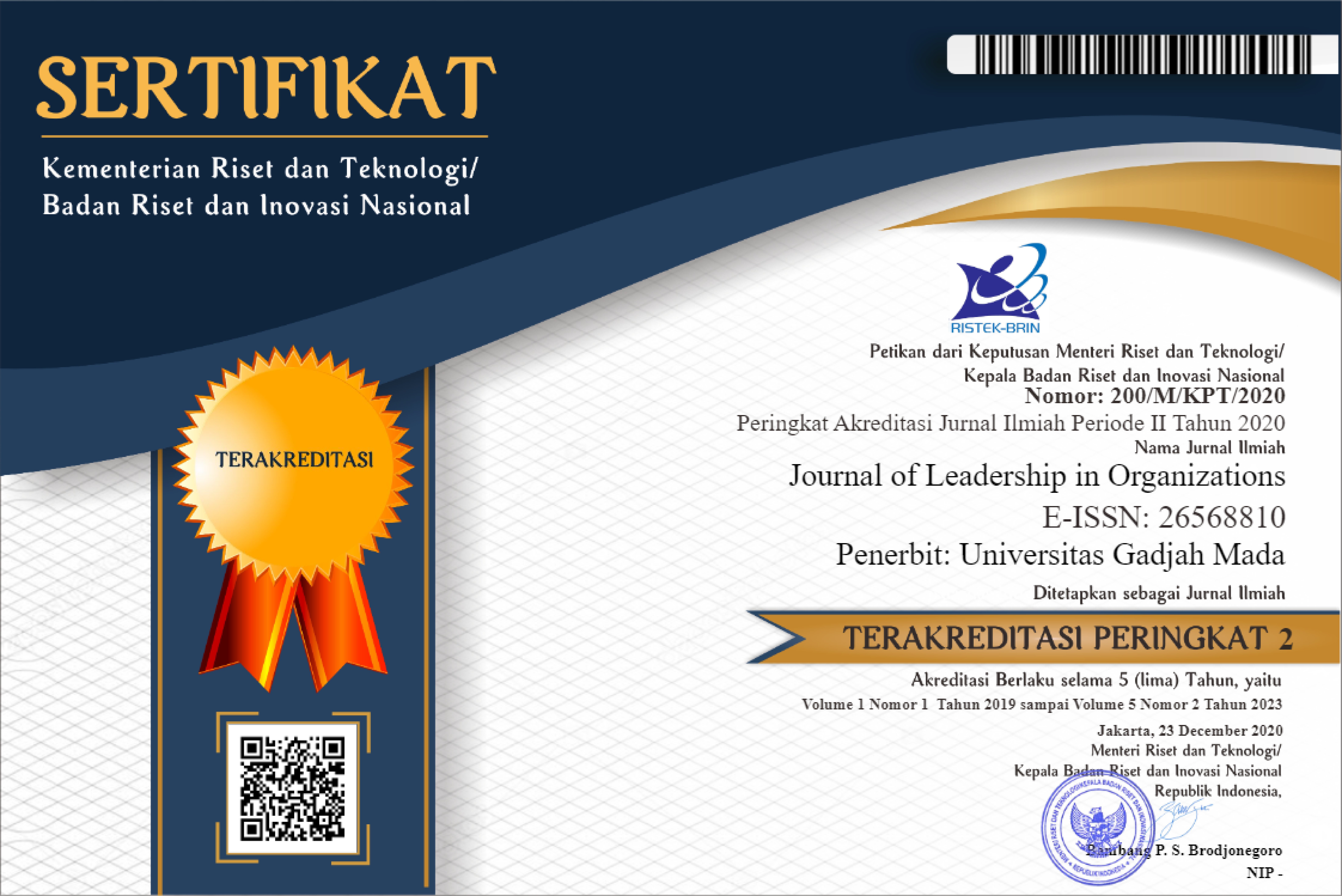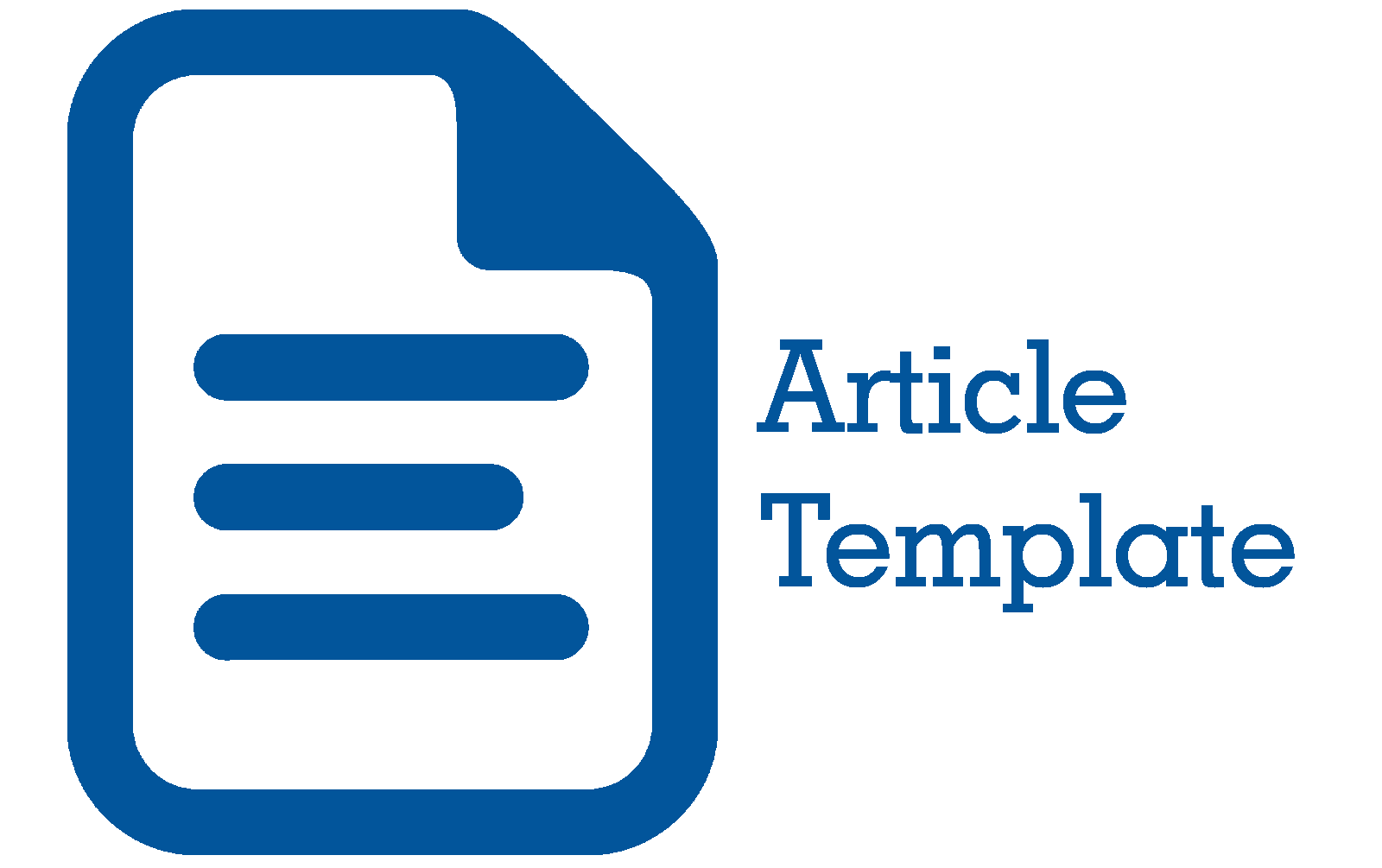The Impact of Temporal and Transformational Leadership on Innovation Performance: A Mediation Analysis of Self-Efficacy
Syamsul Hadi(1*), Heppy Fitriana(2), Kusuma Chandra Kirana(3), Nanang Bagus Subekti(4), Ibukun Joyce Ogwu(5)
(1) Master of Management Department, Faculty of Economics, Universitas Sarjanawiyata Tamansiswa, Yogyakarta, 55165, Indonesia
(2) Master of Management Department, Faculty of Economics, Universitas Sarjanawiyata Tamansiswa, Yogyakarta, 55165, Indonesia
(3) Master of Management Department, Faculty of Economics, Universitas Sarjanawiyata Tamansiswa, Yogyakarta, 55165, Indonesia
(4) Department of English Language Education, Faculty of Teacher Training and Education, UniversitasSarjanawiyata Tamansiswa, Yogyakarta, 55165, Indonesia
(5) Institute of Education, University of Abuja, Abuja, 900105, Nigeria
(*) Corresponding Author
Abstract
Introduction/Main Objectives: Current business growth cannot be optimal if it is not accompanied by innovation performance. This study explores the relationship between innovation performance, temporal leadership, and transformational leadership involving an intervening variable of self-efficacy. Background Problems: The process of transforming management from manual to digital requires leaders to be temporal and transformational to support direct and indirect atmosphere of innovation performance through employees’ self-efficacy. Novelty: Temporal and transformational leadership are like two complementary currency coins in the process of changing from manual management to a digital system. Furthermore, this research has never been carried out, therefore validation is needed. Research Methods: The nonprobability sampling method of the study using saturated sampling involved 85 respondents of the employees of distributor company. The hypotheses were tested using SmartPLS. Finding/Results: The results showed that temporal leadership has a direct significant positive impact on innovation performance and self-efficacy. Additionally, transformational leadership also shows a direct significant positive impact on innovation performance and self-efficacy. This study argues that self-efficacy also shows a significant positive impact on innovation performance. In addition, self-efficacy intervened the impact of temporal and transformational leadership on innovation performance. Conclusion: Temporal and transformational leadership have a beneficial effect in increasing innovation performance and self-efficacy is proven to be a mediation. The practical implication is the need to strengthen leaders to maintain a positive attitude towards employee self-efficacy to carry out innovative performance.
Keywords
Full Text:
PDFReferences
Abbas, M., Sajid, S., & Mumtaz, S. (2018). Personal and Contextual Antecedents of Knowledge Sharing and Innovative Performance among Engineers. Engineering Management Journal, 30, 1–11. https://doi.org/10.1080/10429247.2018.1451681
Abdi, A., & Rohmah, I. Y. (2020). Kepemimpinan Tranformasional: Faktor Determinan Kinerja Karyawan Restoran Pada Hotel Marcure Nexa Pettarani Kota Makassar. Publik (Jurnal Ilmu Administrasi), 9(1), 34. https://doi.org/10.31314/pjia.9.1.34-45.2020
Acar, O. A., Tarakci, M., & van Knippenberg, D. (2019). Creativity and Innovation Under Constraints: A Cross-Disciplinary Integrative Review. Journal of Management, 45(1), 96–121. https://doi.org/10.1177/0149206318805832
Afsar, B., & Masood, M. (2018). Transformational Leadership, Creative Self-Efficacy, Trust in Supervisor, Uncertainty Avoidance, and Innovative Work Behavior of Nurses. The Journal of Applied Behavioral Science, 54(1), 36–61. https://doi.org/10.1177/0021886317711891
Almaududi Ausat, A. M., Suherlan, S., Peirisal, T., & Hirawan, Z. (2022). The Effect of Transformational Leadership on Organizational Commitment and Work Performance. Journal of Leadership in Organizations, 4(1). https://doi.org/10.22146/jlo.71846
Alshebami, A. S. (2023). Green Innovation, Self-Efficacy, Entrepreneurial Orientation and Economic Performance: Interactions among Saudi Small Enterprises. Sustainability, 15(3), 1961. https://doi.org/10.3390/su15031961
Chen, W., Zhang, J.-H., & Zhang, Y.-L. (2022). How shared leadership affects team performance: Examining sequential mediation model using MASEM. Journal of Managerial Psychology, 37(7), 669–682. https://doi.org/10.1108/JMP-04-2021-0258
Choi, J., & Kang, W. (2021). Effects of transformational leadership on teachers’ self-efficacy in education for sustainable development: A serial mediation analysis. Cypriot Journal of Educational Sciences, 16(5), 2534–2547. https://doi.org/10.18844/cjes.v16i5.6343
Gaviria-Marin, M., Merigó, J. M., & Baier-Fuentes, H. (2019). Knowledge management: A global examination based on bibliometric analysis. Technological Forecasting and Social Change, 140, 194–220. https://doi.org/10.1016/j.techfore.2018.07.006
Hadi, S. (2022). MANAJEMEN STRATEGI, Mendapatkan & Mempertahankan Keunggulan Kompetitif (1st ed.). UST-Yogyakarta.
Hadi, S., Pebrianti, E., & Kirana, K. C. (2023). ANALYSIS OF THE EFFECT OF WORK-LIFE BALANCE, SELF-ESTEEM AND WORK MOTIVATION ON ORGANIZATIONAL COMMITMENT MODERATED BY ORGANIZATIONAL JUSTICE ON WORKERS IN YOGYAKARTA. Journal of Education, Teaching, and Learning, 8(1), 7–14.
Hadi, S., Wahyuningtyas, N., Rachmawati, A. P., Tang, L. L., & Mentariningtyas, G. (2023). Innovation and Collaboration in Organizations: A Bibliometric Research. INTERNATIONAL JOURNAL OF ECONOMICS AND MANAGEMENT REVIEW, 1(1), 28–38. https://doi.org/10.58765/ijemr.v1i1.67
Hidayati, S., Hadi, S., Kiranaa, K. C., & Hermawan, H. D. (2022). Trilogi Kepemimpinan Ki Hajar Dewantara dan Kompensasi terhadap Organizational Citizenship Behavior melalui Etos Kerja. EDUKATIF: JURNAL ILMU PENDIDIKAN, 4(3), 18. https://doi.org/10.31004/edukatif.v4i3.3008
Kayani, M. B. A. (2021). Unlocking Temporal Leadership to Handle Project Team Performance under Team Conflict. International Journal of Applied Research in Management and Economics, 4(2), 46–66. https://doi.org/10.33422/ijarme.v4i2.632
Khaola, P., & Coldwell, D. (2019). Explaining how leadership and justice influence employee innovative behaviours. European Journal of Innovation Management, 22(1), 193–212. https://doi.org/10.1108/EJIM-08-2017-0103
Li, L., Su, F., Zhang, W., & Mao, J.-Y. (2018). Digital transformation by SME entrepreneurs: A capability perspective. Information Systems Journal, 28(6), 1129–1157. https://doi.org/10.1111/isj.12153
Li, M., & Ye, H. (2021a). Temporal Leadership and Bootlegging Behavior of Employees: The Mediating Effect of Self-Efficacy. Frontiers in Psychology, 12, 633261. https://doi.org/10.3389/fpsyg.2021.633261
Li, M., & Ye, H. (2021b). Temporal Leadership and Bootlegging Behavior of Employees: The Mediating Effect of Self-Efficacy. Frontiers in Psychology, 12, 633261. https://doi.org/10.3389/fpsyg.2021.633261
Lin, W., Yin, H., & Liu, Z. (2022). The Roles of Transformational Leadership and Growth Mindset in Teacher Professional Development: The Mediation of Teacher Self-Efficacy. Sustainability, 14(11), 6489. https://doi.org/10.3390/su14116489
Liu, Z., Liu, X., & Zhang, X. (2021). How to Solve the Time Dilemma? The Influence of Team Temporal Leadership on Team Innovation Performance. Frontiers in Psychology, 12. https://doi.org/10.3389/fpsyg.2021.634133
Majali, T., Alkaraki, M., Asad, M., Aladwan, N., & Aledeinat, M. (2022). Green Transformational Leadership, Green Entrepreneurial Orientation and Performance of SMEs: The Mediating Role of Green Product Innovation. Journal of Open Innovation: Technology, Market, and Complexity, 8(4), 191. https://doi.org/10.3390/joitmc8040191
Mukti, B., & Tentama, F. (2020). Construction Of Self-Efficacy Scale: A Psychometric Study For Students. 9(01), 5.
Mumtaz, S., & Parahoo, S. K. (2019). Promoting employee innovation performance: Examining the role of self-efficacy and growth need strength. International Journal of Productivity and Performance Management, 69(4), 704–722. https://doi.org/10.1108/IJPPM-12-2017-0330
Najam, U., Inam, A., Awan, H., & Abbas, M. (2018). The Interactive Role of Temporal Team Leadership in the Telecom Sector of Pakistan: Utilizing Temporal Diversity for Sustainable Knowledge Sharing. Sustainability, 10(5), 1309. https://doi.org/10.3390/su10051309
Najib, M., Septiani, S., & Nurlaela, S. (2020a). The role of innovation, entrepreneurial self-efficacy and local uniqueness on marketing performance in small and medium-sized restaurants. Journal of Foodservice Business Research, 23(6), 499–519. https://doi.org/10.1080/15378020.2020.1803687
Najib, M., Septiani, S., & Nurlaela, S. (2020b). The role of innovation, entrepreneurial self-efficacy and local uniqueness on marketing performance in small and medium-sized restaurants. Journal of Foodservice Business Research, 23(6), 499–519. https://doi.org/10.1080/15378020.2020.1803687
Nasir, J., Ibrahim, R. M., Sarwar, M. A., Sarwar, B., Al-Rahmi, W. M., Alturise, F., Samed Al-Adwan, A., & Uddin, M. (2022). The Effects of Transformational Leadership, Organizational Innovation, Work Stressors, and Creativity on Employee Performance in SMEs. Frontiers in Psychology, 13, 772104. https://doi.org/10.3389/fpsyg.2022.772104
Oh, S. H., Shin, Y., & Kim, M. (2020). Are we in-sync? The role of employee–supervisor pacing fit in employee work outcomes. Current Psychology, 39(3), 793–809. Complementary Index.
Oh, S., Shin, Y., & Kim, M. (2020). Are we in-sync? The role of employee–supervisor pacing fit in employee work outcomes. Current Psychology, 39. https://doi.org/10.1007/s12144-019-00258-1
Salanova, M., Rodríguez-Sánchez, A. M., & Nielsen, K. (2022). The impact of group efficacy beliefs and transformational leadership on followers’ self-efficacy: A multilevel-longitudinal study. Current Psychology, 41(4), 2024–2033. Business Source Index.
Sarwat, N., & Abbas, M. (2021a). Individual knowledge creation ability: Dispositional antecedents and relationship to innovative performance. European Journal of Innovation Management, 24(5), 1763–1781. https://doi.org/10.1108/EJIM-05-2020-0198
Sarwat, N., & Abbas, M. (2021b). Individual knowledge creation ability: Dispositional antecedents and relationship to innovative performance. European Journal of Innovation Management, 24(5), 1763–1781. https://doi.org/10.1108/EJIM-05-2020-0198
Sarwat, N., Khurram, S., Khurram, A., & Fatima, S. (2021). Knowledge hiding in organizations: KNOWLEDGE HIDING IN ORGANIZATIONS. Ilkogretim Online - Elementary Education Online, 20(5), 1258–1266. https://doi.org/10.17051/ilkonline.2021.05.140
Teng, C., Hu, C., & Chang, J.-H. (2019). Triggering Creative Self‐Efficacy to Increase Employee Innovation Behavior in the Hospitality Workplace. The Journal of Creative Behavior, 54. https://doi.org/10.1002/jocb.419
Ting, I. W. K., Sui, H. J., Kweh, Q. L., & Nawanir, G. (2021). Knowledge management and firm innovative performance with the moderating role of transformational leadership. Journal of Knowledge Management, 25(8), 2115–2140. https://doi.org/10.1108/JKM-08-2020-0629
Ullah, I., Mirza, B., & Jamil, A. (2021). The influence of ethical leadership on innovative performance: Modeling the mediating role of intellectual capital. Journal of Management Development, 40(4), 273–292. https://doi.org/10.1108/JMD-08-2020-0277
Wan, W., Wang, A., & Li, L. (2021). Temporal leadership and employee workplace deviance: The role of perceived illegitimate tasks. Social Behavior and Personality: An International Journal, 49(7), 1–11. https://doi.org/10.2224/sbp.10386
Wiyono, G. (2020). Merancang penelitian bisnis dengan alat analisis SPSS 25 dan SmartPLS 3.2.8. UPP STIM YKPN.
Zhang, J., van Eerde, W., Gevers, J. M. P., & Zhu, W. (2020). How temporal leadership boosts employee innovative job performance. European Journal of Innovation Management, 24(1), 23–42. https://doi.org/10.1108/EJIM-05-2019-0112
Zhao, W., & Huang, L. (2022). The impact of green transformational leadership, green HRM, green innovation and organizational support on the sustainable business performance: Evidence from China. Economic Research-Ekonomska Istraživanja, 35(1), 6121–6141. https://doi.org/10.1080/1331677X.2022.2047086
Article Metrics
Refbacks
- There are currently no refbacks.
Copyright (c) 2023 Journal of Leadership in Organizations

This work is licensed under a Creative Commons Attribution-ShareAlike 4.0 International License.
| Journal of Leadership in Organizations |
| Journal of Leadership in Organizations (JLO), with registered number ISSN 2656-8829 (Print) and ISSN 2656-8810 (Online), is published by the Center for Leadership Studies, Department of Management, Faculty of Economics and Business, Universitas Gadjah Mada. The content of this website is licensed under a Creative Commons Attribution-ShareAlike 4.0 International License |
| © 2019 Journal of Leadership in Organizations | |





_logo2.png)


.png)




